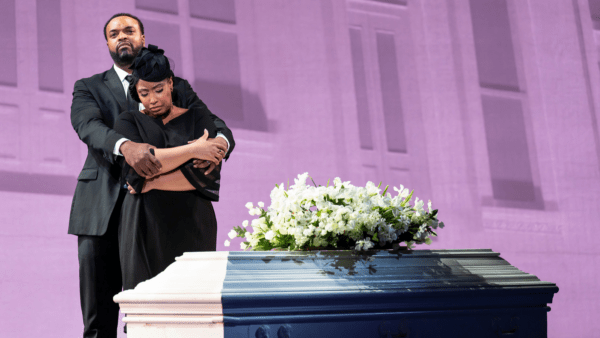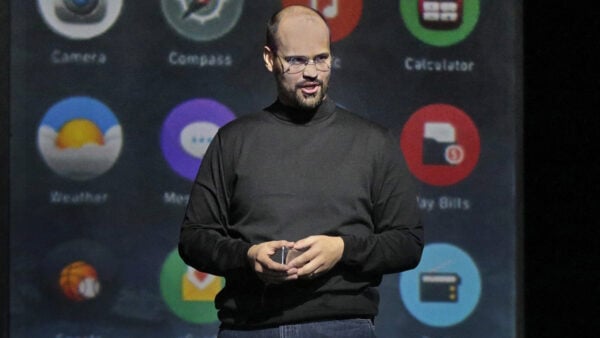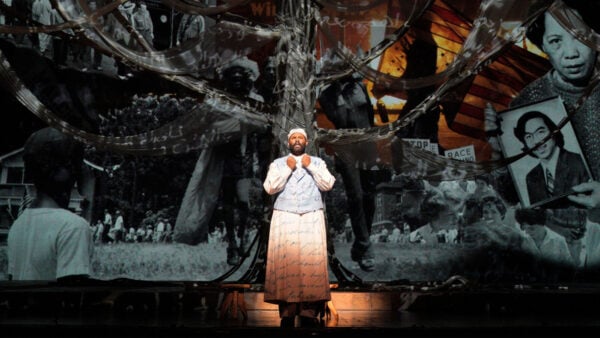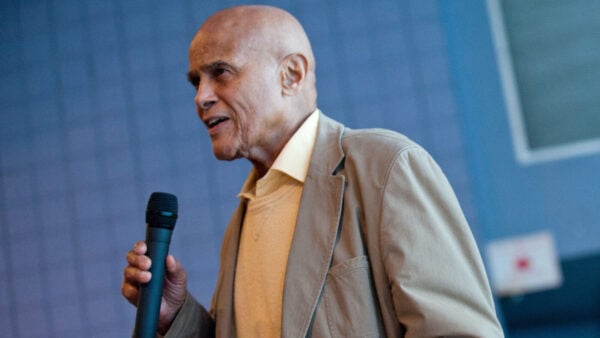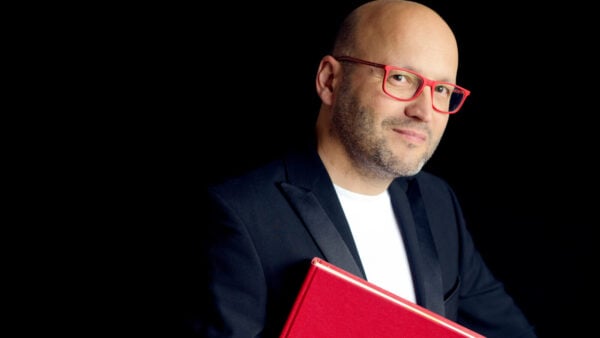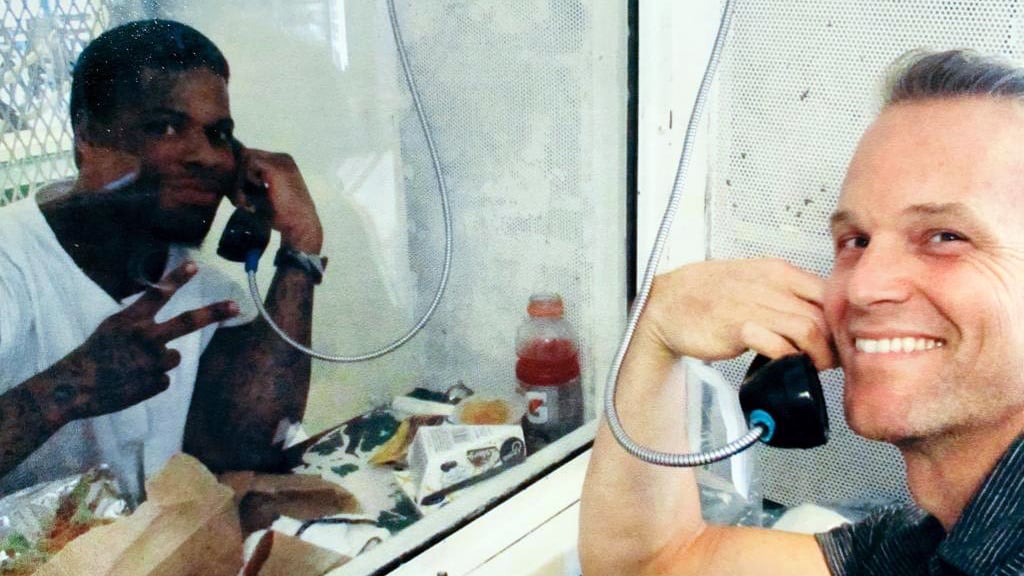
Terence Andrus (L) and Ryan McKinny (R)
“Rising through
chipped paint, rusty doors
stained steel, and cracked floors,
a black rose
rose for an encore.”
These are the moving opening lines of The Black Rose, a poem written by Terence Andrus. The words take on an added depth considering that since 2012, Andrus has been on death row at Allan B. Polunsky Unit, a maximum-security prison in West Livingston, Texas, 75 miles northeast of Houston. Through a pen pal program, Terence Andrus befriended bass-baritone Ryan McKinny, who currently appears as death row inmate Joseph De Rocher in Lyric Opera’s Dead Man Walking.
Earlier this week, McKinny gave the premiere of the musical setting of Andrus’ poem by composer Keith Allegretti as part of the Beyond the Aria series at Harris Theater. The piece is part of a song cycle by Allegretti adapted from poetry of death row inmates.
McKinny, who’s based in Houston, details his and Andrus’ correspondences, eventual friendship, and their first meeting at a Polunsky visiting room in a blog post on his website. WFMT spoke with McKinny about his friendship with Andrus, The Black Rose, and this relationship’s impact on his portrayal of Joseph De Rocher in Dead Man Walking.
WFMT: How did you and Terence Andrus become friends?
Ryan McKinny: When I was in San Francisco doing Girls of the Golden West, a group of us from the cast [including J’Nai Bridges] took a trip to San Quentin. J’Nai had sung the role of Sister Helen once before, and I had heard they were considering me in Chicago for the role of De Rocher. I was asking her about her experience of it while we were on this visit at San Quentin. She mentioned meeting Sister Helen and that she had asked what she could do to help. And Sister Helen, according to J’Nai, said to her, “Just find a person you connect with and just write them.” That kind of stuck with me.
So shortly after that, I just Googled “How do you write an inmate?” There’s this website called writeaprisoner.com, where inmates all over the country and in all different kinds of prisons can post advertisements for pen pals. I found somebody who is on death row — I read the ad and there wasn’t anything particularly unique about it. And that was Terence Andrus.
I wrote him a short letter and basically asking, “I’m doing this role and might be interested in just seeing what your life is like” — kind of a basic thing. He wrote me back this pretty long letter right away. We started writing back and forth. I’d sort of had this mindset already, but it was immediately clear to me that he’s not so different from me. He definitely did what he was accused of — he admits that, or at least a version of that.
We wrote back and forth quite a bit, and I’ve now visited him twice. The first time is the one I wrote about on my blog. And since I posted that, I’ve visited him one more time with Keith Allegretti, who’s the composer of that song about a month ago. I’ll probably go see him again when I’m back in Houston after the run is over in December.

The entrance to the Allan B. Polunsky Unit
WFMT: Did you have any trepidation about starting a friendship with Terence? How did other people kind of respond to this?
McKinny: I would have to say that the vast majority of have responded positively. I think some people have asked me, “Well, were you nervous?” And I guess the answer’s yes. I was definitely nervous going to Polunsky. I wasn’t nervous in the sense of, “Oh, my gosh, I’m going to meet a murderer.” I can’t really say why, but I just don’t personally see these people as the worst thing they’ve ever done. And having written with him quite a bit, I felt like I had a kind of sense where he was coming from. My wife originally was a little nervous about, just having him have our address at home. And I also was sort of nervous about that. Like, you watch TV shows and movies, and y
I’ve also now written back and forth with two other people on death row in Polunsky, and I also picked them randomly, but also people who are easy to write with and really happy to have somebody to talk to. The main thrust of what I’ve taken away is that these people are in isolation, and it’s just a really horrible experience. It either is never going to end or it’s going to end with them being executed, so any time anybody writes a letter or wants to come visit, that’s big for them. So it’s a pretty easy thing to do from my perspective.
The fact that both times I visited Terence, we’re laughing and joking and talking about really important things and then talking about not important things. Just the way you would visit with a friend for a couple of hours, it just happens in this place that’s really, really terrible.
WFMT: What has it been like befriending and becoming an artistic collaborator with Andrus? How has that affected your portrayal of this role?
McKinny: I think it’s supported my portrayals of the role. But maybe part of why I ended up meeting Terence is just my approach to roles. I’ve played a lot of quote-unquote bad guys, and I’ve sort of become known for that. I think one of the reasons is because they don’t treat them as monsters. I don’t treat De Rocher as a monster even though he comes off as monstrous.
I think a lot of people who I’ve talked to have seen this operate and said, “Wow, you’re just really terrifying and you don’t pull any punches” or whatever, but I don’t think of it like I need to make sure he’s bad enough. I’m just trying to be as truthful as I can be about what I feel like a person in that situation is going through. And one of the biggest things I can take away from my experience with Terence is just how much this kind of isolation in this existence and waiting for your time can destroy you just in itself.
I think for a time, Terence was a little bit skeptical that I was interested in being his friend. I think he thought I just was wanting to use him to sort of do role study. And I think there’s some of that in the opera. Joe meets Sister Helen and is pretty skeptical of her motivations. When I first looked at the part, I thought, “Why is he being such an asshole to her?” It’s the only person he’s seen in all this time and she clearly wants to help them. But I think I’ve understood that more through this experience that it’s hard to trust people at all in life, and especially when you’re in that situation. That realization kind of changed how it played De Rocher.
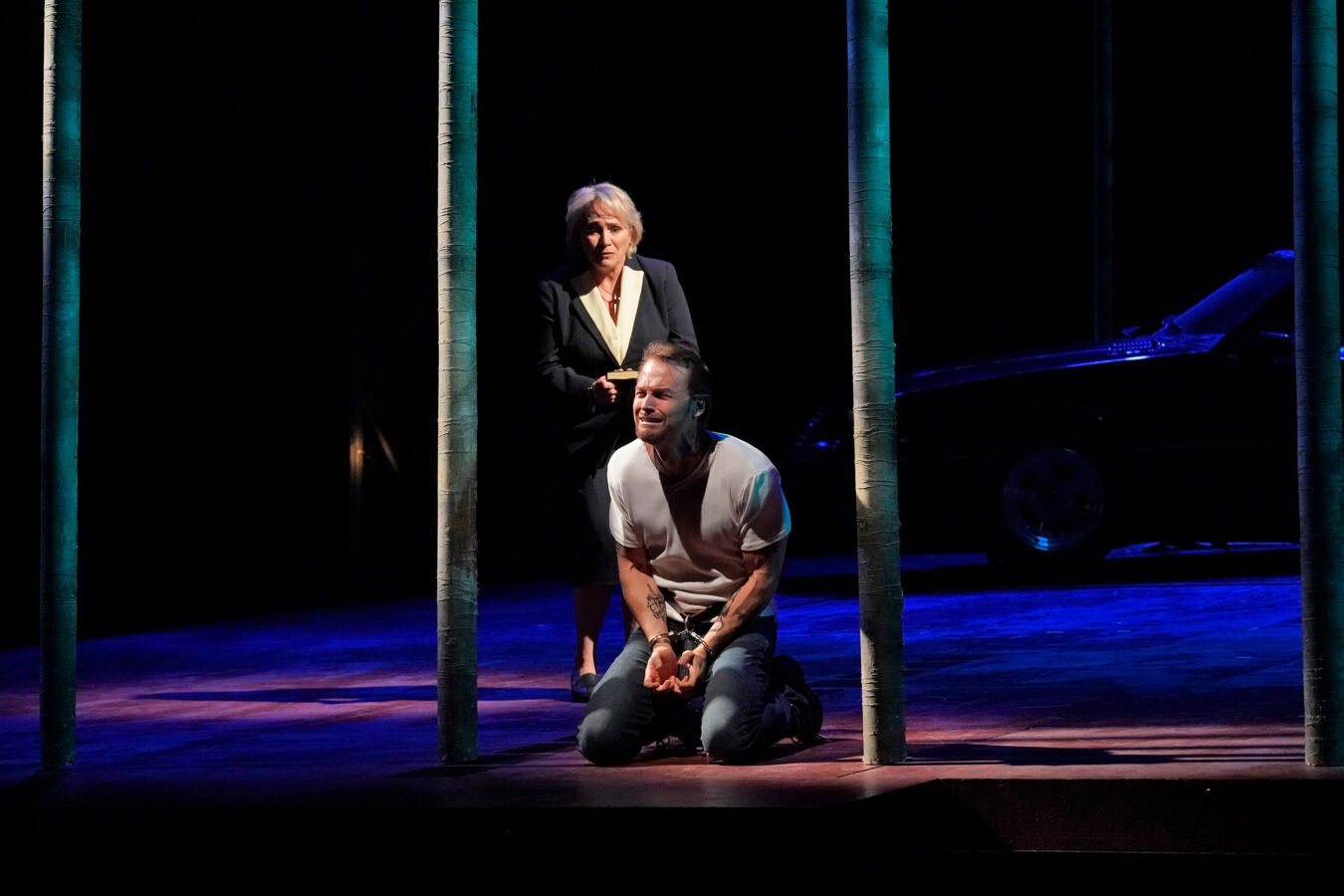
Patricia Racette (Sister Helen Prejean) and Ryan McKinny (Joseph De Rocher) in Dead Man Walking (Photo: Ken Howard)
WFMT: Why do you think it’s important to humanize your portrayal of De Rocher?
McKinny: I asked [Terence’s] permission if I could write about our friendship, and he said yes. And he also said, “I just want people to know that I’m a person, not just my case file.” He doesn’t want me to tell people lies about him being better than he is. He just wants to be human and to me, that’s kind of what the whole opera is about. Can you see this person is human even though you literally watch him do this horrible act on stage? Because that’s scary for us; it’s not just about Joe. It’s about us as we watch it. “Could I ever do that? Am I capable of such a horrible act of a human being? Can I see myself in that person?” Whether or not De Rocher deserves it, what does it cost right now? What does it cost your own soul, for lack of a better word, to put this person to death? Is our society better off or not?
WFMT: Finally, let’s talk about The Black Rose itself. What is it like performing this aria?
McKinny: It’s weird in a couple ways. I don’t portray characters that are written from real life that often. But also, what’s weird is that it’s such a normal kind of my normal way of doing it, which is that I think of how Terence feels about this line or that line. Just the way I would with [any] character… It’s just a way to put some emotion from my side and from Keith’s side into his words. We’re human just like him. Keith can set his music to Terence’s words, and I can put my voice to those words because we see ourselves as human beings just like him.
Dead Man Walking runs at Lyric Opera of Chicago through November 22, 2019. For ticketing and information, visit lyricopera.org.
Editor’s note: This interview has been lightly edited for clarity. On January 21, 2023, Terence Andrus died by suicide at the Polunsky Unit in Livingston, Texas.

